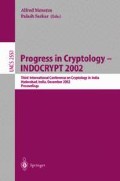Abstract
We present a new resettable zero-knowledge proof system for graph 3-colorability with round complexity O(u(n) log2 n), where u: ℕ → ℝ>0 is any unbounded function and n denotes the number of vertices in the graph. Furthermore, we present a new formulation of the definition of resettable zero-knowledge and define and implement a knowledgeable commitment scheme: after the commitment phase the receiver is convinced that the sender knows a valid decommitment. This remains true even if the receiver is resettable, albeit with the drawback of non-constant round complexity. This is achieved by appending a resettable perfect witness-indistinguishable proof of knowledge of a decommitment to the original commit phase. We base all our constructions on a standard intractability assumption: the hardness of one of the many variants of the discrete logarithm problem.
Access this chapter
Tax calculation will be finalised at checkout
Purchases are for personal use only
Preview
Unable to display preview. Download preview PDF.
References
Eric Bach (1988). How to generate factored random numbers. SIAM Journal on Computing17(2), 179–193. ISSN 0097–5397. Special issue on cryptography.
Boaz Barak (2001). How to Go Beyond the Black-Box Simulation Barrier. In Proceedings of the 42nd Annual IEEE Symposium on Foundations of Computer Science, Las Vegas NV. IEEE Computer Society Press. ISBN 0-7695-1390-5. URL http://www.wisdom.weizmann.ac.il/mathusers/boaz/Papers/nonbb.html. Preliminary full version.
Jurjen Bos, David Chaum & George Purdy (1988). A Voting Scheme. Presented at the rump session of CYRPTO’88 (does not appear in the proceedings).
Joan F. Boyar, Stuart A. Kurtz & Mark W. Krentel (1990). A Discrete Logarithm Implementation of Perfect Zero-Knowledge Blobs. Journal of Cryptology2(2), 63–76. ISSN 0933-2790.
Ran Canetti, Oded Goldreich, Shafi Goldwasser & Silvio Micali (1999). Resettable Zero-Knowledge. Electronic Colloquium on Computational Complexity TR99–042, 1–64. ISSN 1433–8092. ftp://ftp.eccc.uni-trier.de/pub/eccc/reports/1999/TR99-042/Paper.ps.
Ran Canetti, Oded Goldreich, Shafi Goldwasser & Silvio Micali (2000a). Resettable Zero-Knowledge. In Proceedings of the Thirty-second Annual ACM Symposium on the Theory of Computing, Portland OR, 235–244. ACM Press.
Ran Canetti, Oded Goldreich, Shafi Goldwasser & Silvio Micali (2000b). Resettable Zero-Knowledge. Electronic Colloquium on Computational Complexity TR99–042(Revision 1), 1–60. ISSN 1433-8092. ftp://ftp.eccc.uni-trier.de/pub/eccc/reports/1999/TR99-042/revisn01.ps.
Ran Canetti, Joe Kilian, Erez Petrank & Alon Rosen (2001). Black-Box Concurrent Zero-Knowledge Requires \( \tilde \Omega \left( {\log {\mathbf{ }}n} \right) \) Rounds. In Proceedings of the Thirtythird Annual ACM Symposium on the Theory of Computing, Hersonissos, Crete, Greece, 570–579. ACM Press, 1515 Broadway, New York, New York 10036. ISBN 1-58113-349-9.
David Chaum, Ivan Damgård & Jeroen van de Graaf (1987). Multiparty Computations Ensuring Privacy of Each Party’s Input and Correctness of the Result. In Advances in Cryptology: Proceedings of CRYPTO’ 87, Santa Barbara CA, Carl Pomerance, editor, number 293 in Lecture Notes in Computer Science, 87–119. Springer-Verlag. ISBN 3-540-18796-0. ISSN 0302-9743.
D. Chaum, E. van Heijst & B. Pfitzmann (1992). Cryptograhically strong undeniable signatures, unconditionally secure for the signer. In Feigenbaum (1992), 470-484. http://link.springer.de/link/service/series/0558/tocs/t0576.htm.
Danny Dolev, Cynthia Dwork & Moni Naor (1991). Non-Malleable Cryptography. In Proceedings of the Twenty-third Annual ACM Symposium on the Theory of Computing, New Orleans LA, 542–552. ACM Press. http://citeseer.nj.nec.com/dolev91nonmalleable.html.
Uriel Feige, Dror Lapidot & Adi Shamir (1999). Multiple noninteractive zero knowledge proofs under general assumptions. SIAM Journal on Computing29(1), 1–28. ISSN 0097-5397, 1095-7111. http://epubs.siam.org/sam-bin/dbq/article/23001.
J. Feigenbaum (editor) (1992). Advances in Cryptology: Proceedings of CRYPTO’ 91, Santa Barbara CA, number 576 in Lecture Notes in Computer Science. Springer-Verlag, Berlin. ISBN 3-540-55188-3. ISSN 0302-9743. http://link.springer.de/link/service/series/0558/tocs/t0576.htm.
Oded Goldreich (2001). Foundations of Cryptography. Cambridge University Press, Cambridge. ISBN 0-521-79172-3.
Oded Goldreich & Ariel Kahan (1996). How to construct constant-round zeroknowledge proof systems for NP. Journal of Cryptology9(3), 167–189.
Joe Kilian, Erez Petrank & Charles Rackoff (1998). Lower Bounds for Zero Knowledge on the Internet. In Proceedings of the 39th Annual IEEE Symposium on Foundations of Computer Science, Palo Alto CA, 484–492. IEEE Computer Society Press, Palo Alto, CA.
Joe Kilian, Erez Petrank & Ransom Richardson (2001). On Concurrent and Resettable Zero-Knowledge Proofs for NP. http://www.cs.technion.ac.il/~erez/czkub-full.ps. Preprint.
Torben Pryds Pedersen (1992). Non-Interactive and Information-Theoretic Secure Verifiable Secret Sharing. In Feigenbaum (1992), 129–140. http://link.springer.de/link/service/series/0558/bibs/0576/05760129.htm.
Ransom Richardson & Joe Kilian (1999). On the concurrent composition of zeroknowledge proofs. In Advances in Cryptology: Proceedings of EUROCRYPT 1999, Prague, Czech Republic, Jacques Stern, editor, number 1592 in Lecture Notes in Computer Science, 415–431. ISBN 3-540-65889-0. ISSN 0302-9743.
Alon Rosen (2000). A Note on the Round-Complexity of Concurrent Zero-nowledge. In Advances in Cryptology: Proceedings of CRYPTO’ 00, Santa Barbara CA, M. Bellare, editor, number 1880 in Lecture Notes in Computer Science, 451–468. Springer-Verlag. ISSN 0302-9743. http://link.springer.de/link/service/series/0558/bibs/1880/18800451.htm.
Author information
Authors and Affiliations
Editor information
Editors and Affiliations
Rights and permissions
Copyright information
© 2002 Springer-Verlag Berlin Heidelberg
About this paper
Cite this paper
Müller, O., Nüsken, M. (2002). Never Trust Victor: An Alternative Resettable Zero-Knowledge Proof System. In: Menezes, A., Sarkar, P. (eds) Progress in Cryptology — INDOCRYPT 2002. INDOCRYPT 2002. Lecture Notes in Computer Science, vol 2551. Springer, Berlin, Heidelberg. https://doi.org/10.1007/3-540-36231-2_8
Download citation
DOI: https://doi.org/10.1007/3-540-36231-2_8
Published:
Publisher Name: Springer, Berlin, Heidelberg
Print ISBN: 978-3-540-00263-5
Online ISBN: 978-3-540-36231-9
eBook Packages: Springer Book Archive

